介词from
介词 at, from, for
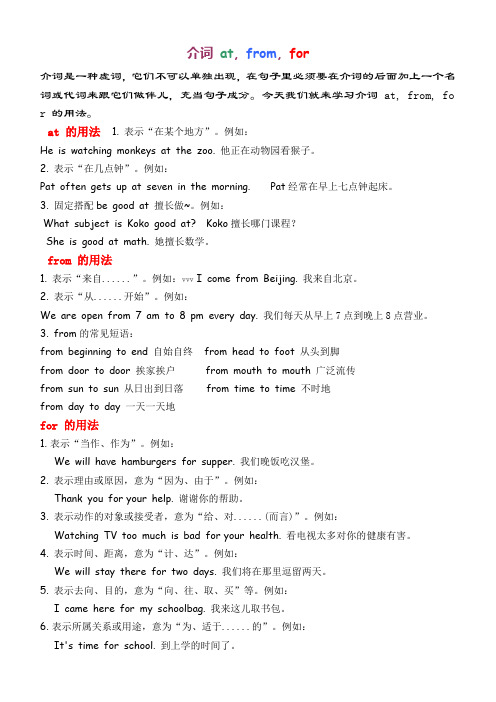
介词at,from,for介词是一种虚词,它们不可以单独出现,在句子里必须要在介词的后面加上一个名词或代词来跟它们做伴儿,充当句子成分。
今天我们就来学习介词 at, from, fo r 的用法。
at 的用法 1. 表示“在某个地方”。
例如:He is watching monkeys at the zoo.他正在动物园看猴子。
2.表示“在几点钟”。
例如:Pat often gets up at seven in the morning. Pat经常在早上七点钟起床。
3. 固定搭配be good at 擅长做~。
例如:What subject is Koko good at?Koko擅长哪门课程?She is good at math.她擅长数学。
from 的用法1.表示“来自......”。
例如:vvv I come from Beijing. 我来自北京。
2. 表示“从......开始”。
例如:We are open from 7 am to 8 pm every day. 我们每天从早上7点到晚上8点营业。
3. from的常见短语:from beginning to end 自始自终from head to foot从头到脚from door to door 挨家挨户from mouth to mouth 广泛流传from sun to sun 从日出到日落from time to time 不时地from day to day 一天一天地for 的用法1. 表示“当作、作为”。
例如:We will have hamburgers for supper. 我们晚饭吃汉堡。
2. 表示理由或原因,意为“因为、由于”。
例如:Thank you for your help. 谢谢你的帮助。
3. 表示动作的对象或接受者,意为“给、对......(而言)”。
例如:Watching TV too much is bad for your health. 看电视太多对你的健康有害。
from to的用法区别 (2)
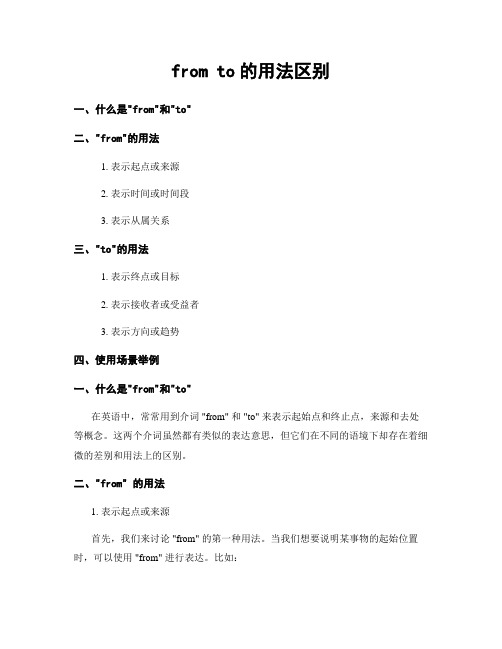
from to的用法区别一、什么是"from"和"to"二、"from"的用法1. 表示起点或来源2. 表示时间或时间段3. 表示从属关系三、"to"的用法1. 表示终点或目标2. 表示接收者或受益者3. 表示方向或趋势四、使用场景举例一、什么是"from"和"to"在英语中,常常用到介词 "from" 和 "to" 来表示起始点和终止点,来源和去处等概念。
这两个介词虽然都有类似的表达意思,但它们在不同的语境下却存在着细微的差别和用法上的区别。
二、"from" 的用法1. 表示起点或来源首先,我们来讨论 "from" 的第一种用法。
当我们想要说明某事物的起始位置时,可以使用 "from" 进行表达。
比如:- I am from China.- The book fell from the shelf.在以上两个例句中,第一个例句中的 "from China" 表示了人物(即"I")的出生地或以前所居住地;第二个例句中,“fell from the shelf” 则表明书籍掉落的起始地。
2. 表示时间或时间段其次,"from" 还可以用来表示一个时间起点或某个特定时间段的起始。
例如:- The party will last from 7 p.m. to 10 p.m.- I work from Monday to Friday.以上两个例句中,第一个例句涉及了一个活动的开始时间和结束时间;第二个例句则表示了工作的周期性。
3. 表示从属关系此外,"from" 还常用于表达一个事物的来源或从属关系。
例如:- This idea came from my friend.- The data is collected from various sources.以上两个例句中,第一个例句表明这个想法是由我的朋友提出的;第二个例句表明数据是从多种来源收集而来的。
介词from用法注意
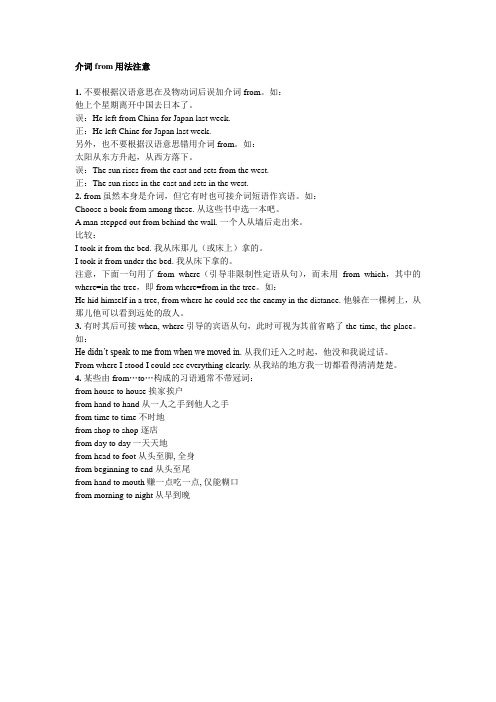
介词 from 用法注意1.不要根据汉语意思在及物动词后误加介词 from。
如:他上个星期离开中国去日本了。
误:He left from China for Japan last week.正:He left Chine for Japan last week.另外,也不要根据汉语意思错用介词 from。
如:太阳从东方升起,从西方落下。
误:The sun rises from the east and sets from the west.正:The sun rises in the east and sets in the west.2. from虽然本身是介词,但它有时也可接介词短语作宾语。
如:Choose a book from among these. 从这些书中选一本吧。
A man stepped out from behind the wall. 一个人从墙后走出来。
比较:I took it from the bed. 我从床那儿(或床上)拿的。
I took it from under the bed. 我从床下拿的。
注意,下面一句用了 from where(引导非限制性定语从句),而未用from which,其中的where=in the tree,即 from where=from in the tree。
如:He hid himself in a tree, from where he could see the enemy in the distance. 他躲在一棵树上,从那儿他可以看到远处的敌人。
3.有时其后可接when, where引导的宾语从句,此时可视为其前省略了the time, the place。
如:He didn’t speak to me from when we moved in.从我们迁入之时起,他没和我说过话。
From where I stood I could see everything clearly. 从我站的地方我一切都看得清清楚楚。
by和from的用法
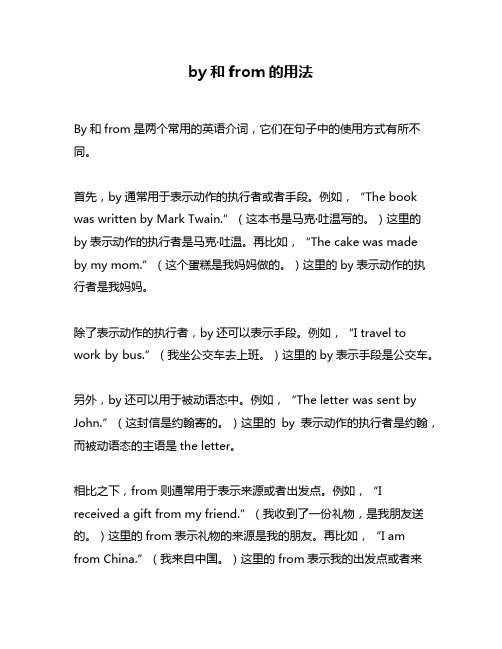
by和from的用法By和from是两个常用的英语介词,它们在句子中的使用方式有所不同。
首先,by通常用于表示动作的执行者或者手段。
例如,“The book was written by Mark Twain.”(这本书是马克·吐温写的。
)这里的by表示动作的执行者是马克·吐温。
再比如,“The cake was made by my mom.”(这个蛋糕是我妈妈做的。
)这里的by表示动作的执行者是我妈妈。
除了表示动作的执行者,by还可以表示手段。
例如,“I travel to work by bus.”(我坐公交车去上班。
)这里的by表示手段是公交车。
另外,by还可以用于被动语态中。
例如,“The letter was sent by John.”(这封信是约翰寄的。
)这里的by表示动作的执行者是约翰,而被动语态的主语是the letter。
相比之下,from则通常用于表示来源或者出发点。
例如,“I received a gift from my friend.”(我收到了一份礼物,是我朋友送的。
)这里的from表示礼物的来源是我的朋友。
再比如,“I am from China.”(我来自中国。
)这里的from表示我的出发点或者来源是中国。
除了表示来源或者出发点,from还可以表示时间或者距离。
例如,“The train from Beijing arrives at 5 pm.”(从北京开出的火车将在下午5点到达。
)这里的from表示时间是从北京出发的火车到达的时间。
再比如,“The hotel is 10 minutes from the airport.”(这家酒店距离机场10分钟车程。
)这里的from表示距离是酒店离机场的距离。
总的来说,by和from都是常用的英语介词,它们在句子中的使用方式有所不同。
By通常用于表示动作的执行者或者手段,而from则通常用于表示来源或者出发点。
英语中介词from用法归纳
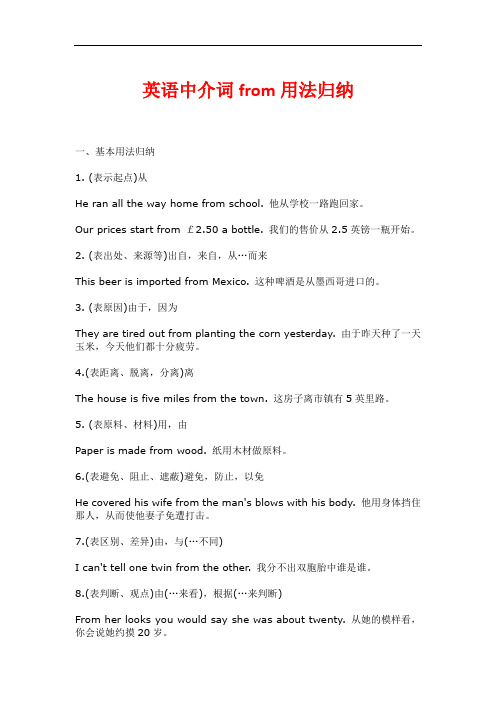
英语中介词from用法归纳一、基本用法归纳1. (表示起点)从He ran all the way home from school. 他从学校一路跑回家。
Our prices start from £2.50 a bottle. 我们的售价从2.5英镑一瓶开始。
2. (表出处、来源等)出自,来自,从…而来This beer is imported from Mexico. 这种啤酒是从墨西哥进口的。
3. (表原因)由于,因为They are tired out from planting the corn yesterday. 由于昨天种了一天玉米,今天他们都十分疲劳。
4.(表距离、脱离,分离)离The house is five miles from the town. 这房子离市镇有5英里路。
5. (表原料、材料)用,由Paper is made from wood. 纸用木材做原料。
6.(表避免、阻止、遮蔽)避免,防止,以免He covered his wife from the man's blows with his body. 他用身体挡住那人,从而使他妻子免遭打击。
7.(表区别、差异)由,与(…不同)I can't tell one twin from the other. 我分不出双胞胎中谁是谁。
8.(表判断、观点)由(…来看),根据(…来判断)From her looks you would say she was about twenty. 从她的模样看,你会说她约摸20岁。
9.(表根据、依据)凭,据:He played the music from memory. 他凭记忆演奏了那首曲子。
二、用法搭配归纳1. from…on 从…起He never spoke to her again from that day on. 从那天以后他再没有同她说过话。
2. from…to…从…到…He flew from Beijing to Shanghai. 他坐飞机从北京到上海。
from短语练习题

from短语练习题from短语是英语中一个常见的使用方式,指的是使用介词from搭配名词、代词或动词的动名词形式。
它具有多种表达含义和用法,包括表示起点、来源、出处、原因等。
在本文中,我将为大家介绍一些常用的from短语及其用法,以帮助我们更好地理解和运用这一语法结构。
一、表示起点1. from here/there:从这里/那里例如:- I walked from here to there.(我从这里走到那里。
)2. from now on:从现在起例如:- From now on, I will focus on my studies.(从现在起,我会专注于学业。
)二、表示来源1. from...to/from...until:从...到...例如:- I will be in Paris from Monday to Friday.(我将从星期一到星期五在巴黎。
)2. from (place):来自...例如:- The delegate is from Japan.(这位代表来自日本。
)三、表示出处1. from (book, article):引用自...例如:- The following quote is from Shakespeare's Romeo and Juliet.(下面的引文摘自莎士比亚的《罗密欧与朱丽叶》。
)2. from (source):从...处获得例如:- I got this information from a reliable source.(我从一个可靠的来源得到了这个信息。
)四、表示原因1. from (reason):由于...例如:- Sam couldn't come to the party from lack of transportation.(山姆由于交通不便无法来参加派对。
)2. from (experience):通过经验...例如:- I learned from my mistakes.(我通过错误中学到了教训。
in和from的用法
in和from的用法一、in和from的用法简介in和from是英语中常见的介词,它们具有多种用法和含义,在不同的语境中表达不同的意思。
本文将详细解释in和from在不同情况下的常见用法,并举例说明其正确使用方法。
二、表示位置或范围1. in的用法:a) 表示位置:in可以指示某物或某人处于某个地点或空间当中。
例如:- The book is in the drawer.(书在抽屉里。
)- He is in the kitchen preparing dinner.(他正在厨房准备晚餐。
)b) 表示范围:in可以表示某事物所包含或涉及到的范围。
例如:- There are many colleges in this city.(这个城市有很多大学。
)- She spent her childhood years in New Zealand.(她在新西兰度过了童年时光。
)2. from的用法:a) 表示起点:from可以指示某事物或某人起源于、来自于某个地方。
例如:- I am from Canada.(我来自加拿大。
)- This painting is from a famous artist.(这幅画出自著名艺术家之手。
)b) 表示移动方向:from可以指明运动开始的地点或方向来源。
例如:- The car is coming from the North.(汽车是从北方驶来的。
)- We walked from the park to the museum.(我们从公园走到了博物馆。
)三、表示时间1. in的用法:a) 表示将来某个时间点:in可以指示在未来的某个具体时间点。
例如:- I will meet him in an hour.(我将在一个小时后见他。
)- The train is scheduled to arrive in five minutes.(火车计划在五分钟后到达。
foroffrom的用法
foroffrom的用法一、for, of, from 的基本概念二、for, of, from 在常见用法中的区别2.1 for 的用法2.2 of 的用法2.3 from 的用法三、补充例句,强化对于 for, of, from 的理解一、for, of, from 的基本概念英语中,介词是一个重要的语法成分,起着连接词与词之间关系的作用。
其中,常见的介词之一为“for”,还有两个相似但含义稍为不同的介词“of” 和“from”。
虽然这三个介词在某些情况下可以互换使用,但它们也有自己特定的使用场景。
二、for, of, from 在常见用法中的区别在具体细分的用法上,我们来看看for, of 和from 分别在哪些情况下会被使用。
2.1 for 的用法介词“for” 具备多种含义和用途。
首先,它可以表示目标或目的。
例如,“I bought flowers for my mother's birthday" 表示为了庆祝母亲生日我买了花。
此外,在描述时间段时,“for” 可以用来表达持续时间。
例如,“He worked overtime for two hours” 意味着他加班了两个小时。
其次,介词“for” 还可以表示代替。
例如,“She speaks for me at the meeting” 表示她代表我在会议上发言。
此外,介词“for” 常用于表达适合、具备某条件或可能性的意思。
例如,“He is too young for driving” 意为他太年轻了不能开车。
“This dress is perfect for the party”则表示这件衣服非常适合派对。
2.2 of 的用法介词“of” 通常被用来表示所属关系、来源或内容等。
首先,“of” 可以表达所有权或关系。
例如,“The book on the table is John's”。
这里,“of” 表示这本书是属于约翰的。
about、after、at、for、from的用法 -回复
about、after、at、for、from的用法-回复关于[about、after、at、for、from的用法],我们将分步回答解答您的问题。
1. "about"的用法:"about"是一个多功能的介词,其主要用法如下:- 表示关于某个话题或主题,表示对某事的知识或意识。
例如:"I read a book about the history of China."(我读了一本关于中国历史的书。
)- 表示大约,大概的意思。
例如:"She is about 30 years old."(她大约30岁。
)- 表示在某个地方或位置附近。
例如:"He is walking about the park."(他围着公园走。
)2. "after"的用法:"after"是一个介词,表示在某个事件或行动之后发生的事情。
它也可以表示在某个时间之后。
例如:- "She arrived home after work."(她下班后回到家。
)- "After dinner, we went for a walk."(晚餐后,我们去散步。
)- "I will call you after 9 p.m."(晚上9点后我会给你打电话。
)3. "at"的用法:"at"是一个常见的介词,其主要用法如下:- 表示在某个具体的地点或位置。
例如:"I am at home."(我在家。
)- 表示在某个具体的时间。
例如:"The meeting is at 10 a.m."(会议在上午10点。
)- 表示某个特定的地点或位置。
例如:"I met him at the library."(我在图书馆遇到他。
in,on,from的用法
in,on,from的用法一级标题:介词 in、on、from 的基本用法引言:介词是英语中非常常见和重要的语法元素,其中 in、on 和 from 是三个常用的介词。
它们在句子中具有不同的功能和含义,并且经常出现在各种日常交流和书面表达中。
本文将详细探讨这三个介词在不同语境下的运用,以帮助读者准确理解并运用这些介词。
二级标题1:in 的用法1. 表示位置或地点:在描述一个具体位置或地点时,我们经常使用 in 这个介词。
例如:- I'm currently living in New York City.- The shop is just around the corner, on the left side.2. 表示时间或日期:我们还可以使用 in 来表示某个特定的时间点或日期。
例如:- The meeting will be held in two hours.- She was born in 1990.3. 表示成员或参与者身份:在描述属于某个团体、组织或集体中的成员时,我们也可以使用 in 这个介词。
例如:- John is working in a software company.- Lisa is studying to become a doctor in the university.4. 表示领域或专业:当表示某人所从事的工作领域或专业时,同样可以使用 in。
例如:- He is an expert in physics.- She has a lot of experience in marketing.二级标题2:on 的用法1. 表示位置或地点:在描述一个表面、平台或接触处时,我们常常使用 on 这个介词。
例如: - The book is on the table.- He put his glasses on his head.2. 表示日期或星期几:当提及具体的日期或星期几时,我们可以使用介词 on。
- 1、下载文档前请自行甄别文档内容的完整性,平台不提供额外的编辑、内容补充、找答案等附加服务。
- 2、"仅部分预览"的文档,不可在线预览部分如存在完整性等问题,可反馈申请退款(可完整预览的文档不适用该条件!)。
- 3、如文档侵犯您的权益,请联系客服反馈,我们会尽快为您处理(人工客服工作时间:9:00-18:30)。
在英语学习中,我们会发现“V...from...”结构屡见不鲜,现将其用法归纳如下:一、表示“辨别/分辨/区分”等。
如:1. tell...from... 辨别,识别,认出She can never tell natural silk from artificial.她不能辨别真丝和人造丝。
2. know...from... 辨别,识别,认出(1) Infants don’t know right from wrong.婴/幼儿不会辨别是非。
(2) Do you know him from his twin brother? 你能把他和他的孪生兄弟分清楚吗?3. distinguish... from... 辨别(1)Please tell me how to distinguish a poisonous snake from a harmless one. 请告诉我怎样分辨毒蛇和无毒蛇。
(2) Can you distinguish cotton cloth from wool? 你能区分棉布和毛料吗?(3) Speech distinguishes man from the other animals. 人类区别于其他动物,是因为人会说话。
4. discriminate... from... 辨别/分辨(1) He can’t discriminate fact from fiction.他不能辨别事实和虚构。
(2) Can’t you discriminate good from bad? 难道你不会辨别好坏吗?二、表示“阻止/ 妨碍(某人/ 事物)做”,“阻止/妨碍使不能”等。
如:1. prevent... from... 阻止;妨碍(1) No one can prevent the plan from being carried out. 谁也阻止不了这项计划的实施。
(2) I wonder what prevented him entering for the sports meet. 我不明白他为什么没报名参加运动会。
2. keep... from... 阻止;妨碍(1) His advice kept me from making a serious mistake. 听了他的忠告,我才没犯重大错误。
(2) How can we keep him from staying up late? 我们怎么才能让他不熬夜?3. stop... from... 阻止;妨碍(1) I stopped her from telling the news to her friends.我不让她把那个消息告诉她的朋友。
(2) Nothing could stop me from achieving my ambition. 什么都不能阻止我实现自己的抱负。
4. prohibit... from... 阻止;妨碍(1) His poor eyesight prohibited him from becoming a pilot. 他因视力弱而不能当飞行员。
(2)The heavy rain prohibited the players from playing football. 雨下得太大,队员们无法踢球。
5. inhibit... from... 妨碍;抑制;制止(1) His poor English inhibits him from communicating with others freely. 他英语不好,不能与他人自由交流。
(2)This feature of the book would be enough to inhibit a lot of people from reading it. 该书的这个特点足以让许多读者望而却步。
7. deter... from... 制止;阻止;防止(1) Failure didn’t deter him from making another attempt. 失败未能使他放弃努力。
(2) Several factors deter new industry from coming to the area. 多种因素阻碍了新兴工业在该地区的出现。
(3) Do you believe that nuclear weapons will deter countries from making war? 你相信核武器能阻止国家之间爆发战争吗?8. hinder... from... 妨碍;阻碍(1)Frequent telephone hindered us from falling asleep. 频繁的电话使我们无法入睡。
(2)The child’s hysterical crying hindered the doctor from completing the examination. 那孩子拼命地哭闹,弄得医生无法对他进行检查。
9. preclude... from... 妨碍;阻止(1) It would preclude them (from ) taking proceedings. 这样也许能阻止他们起诉。
(2)The high fever precluded him from attending the opening ceremony.他发高烧,无法出席开幕式。
比较译文:高烧使他不能出席开幕式。
三、表示“保护/保卫/防御不/免受”等。
如:1. protect... from... 保护……不受;保卫……不受(1) Y ou mustn’t protect your brother from blame in the accident. 你不能包庇你兄弟逃脱事故的罪责(2) He was wearing dark glasses to protect his eyes from the sun. 他戴着墨镜以避阳光。
2.preserve...from...保护……不受/免于(1) Oil can preserve metal from rust. 油可以保护金属使其免于生锈。
(2)We all should make every effort to preserve the environment from pollution. 我们应当尽一切努力保护环境不受污染。
3. defend... from... 防御……不受;保护……不受;保卫……不受(1) The law defends people from injustice.法律保护人民的正当权益不受侵犯。
(2) Parents need to defend their children from a mad dog. 父母需要保护自己的孩子不受疯狗伤害。
4. guard...from... 保护/守护……免受(1) A helmet guards your head from/against injuries. 头盔可以保护头部免受伤害。
(2) Heavily armed soldiers guarded the airport from the terrorists. 全副武装的士兵守卫着机场,以防恐怖分子袭击。
5. shield... from... 保护不受,防护不受(1) The government tried shielding a state-owned economy from the competitive pressure of global market. 政府设法保护国有经济免受全球市场的竞争压力。
(2)A posture of cool professionalism shielded him from the pain he saw and felt. 他的职业特性使他变得冷酷无情,对他所看到或感觉到的痛苦无动于衷。
6. shelter...from... 保护……不/免受;庇护……不/免受;遮蔽……不/免受(1) The workers use masks to shelter their eyes from the glare of the fire. 工人们用面具遮挡刺眼的火光。
(2) The rounded hills shelter the picturesque village from the cold wind. 圆形的小山作为屏障,使寒风吹不到这座风景如画的村庄。
7. fence... from... (筑篱)防护……不受;保卫……不受The gardeners fenced the seedbeds from the north wind. 园丁们为苗床筑篱以遮北风。
四、表示“从……解救(某人);解放;摆脱”等。
如:1.save...from...从救;搭救,挽救(1) The woman rushed in and saved the child from the burning house. 那女人冲进去把孩子从着火的房子中救了出来。
(2) Knowledge saves a person from the results of his own ignorance. 知识使人免食无知之果。
2. deliver... from... 从……救出;解放liberate…from(1) May God deliver us from evil. 愿上帝拯救我们脱离罪恶。
(2) They delivered the blacks from slavery.他们把奴隶制度下的黑人解放了出来。
3. rescue... from... 从……救出;救助,解救(1) The fireman rescued a baby from the burning house. 消防队员从失火的房子里救出一个婴儿。
(2) They rescued a boy from drowning. 他们把溺水的男孩救了上来。
五、表示“禁止,把排除在外”等。
如:1. bar... from... 禁止,排斥,扫除(1) Women are barred from the club. 本俱乐部谢绝女性参加。
(2) The ordinance bars aliens from sensitive positions. 法令不准外国侨民担任机要职务。
2. exclude... from... 把……排除在外;禁止,阻止(1) They exclude Peter from becoming the full number of the club. 他们拒绝彼得成为俱乐部的正式成员。
